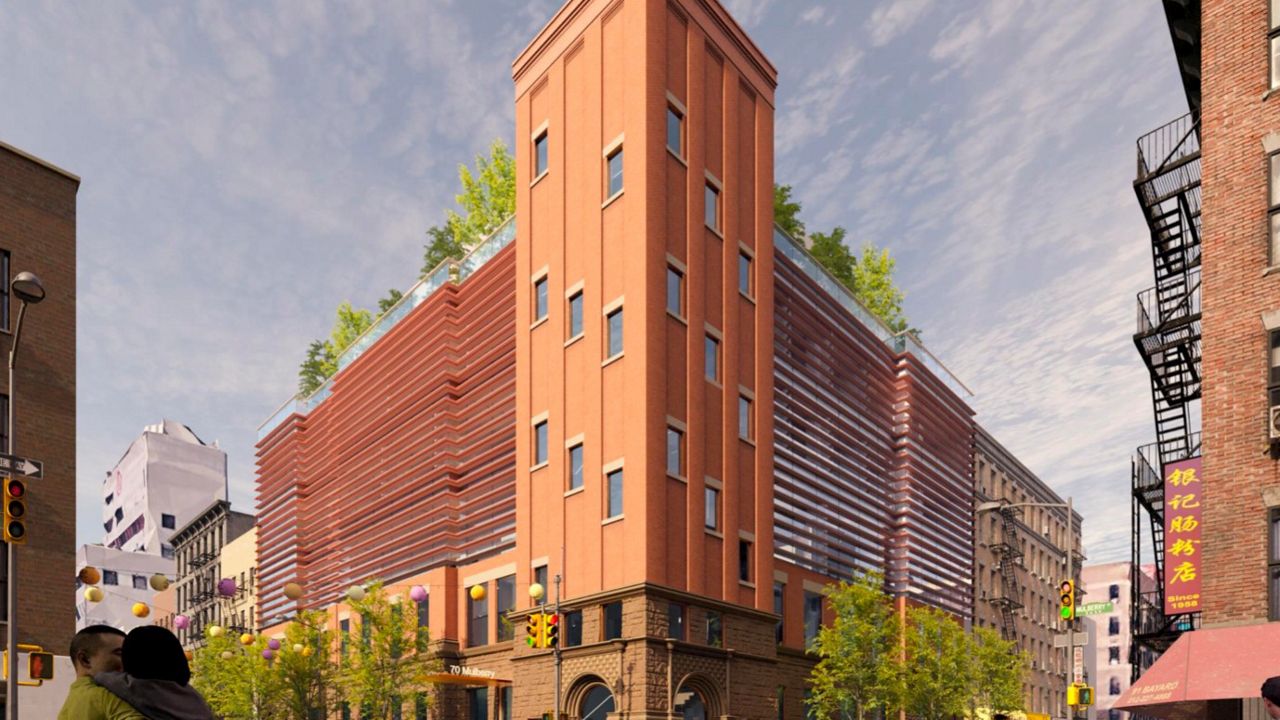The historic 70 Mulberry Street building in Chinatown, which was ravaged by a devastating fire three years ago, is one step closer to being rebuilt.
Members of Community Board 3, which includes the Lower East Side, the East Village and part of Chinatown, voted to pass the city’s exterior design proposal for construction of the new building at a full board meeting Tuesday night.
The design will preserve and restore portions of the existing historic facade, including the two-story street facades and the six-story stair tower facade on the corner of the building.
What You Need To Know
- The historic 70 Mulberry Street building in Chinatown, which was ravaged by a devastating fire three years ago, is one step closer to being rebuilt
- Members of Community Board 3 voted to pass the city’s exterior design proposal for construction of the new building at a full board meeting Tuesday night
- The proposal will return 51,000 square feet to the five nonprofits that operated in the building before the fire broke out, including the research and collections department of the Museum of Chinese in America
It will also return 51,000 square feet to the five nonprofits that operated in the building before the fire broke out, including the research and collections department of the Museum of Chinese in America.
Leaders of the nonprofits have voiced support for the current proposal, which is being spearheaded by the Department of Citywide Administrative Services and the Department of Design and Construction.
“DCAS has done a really thorough job, and they have included all of the five tenants, the nonprofit organizations that have been based historically [there] pre-fire, in the process of community feedback,” MOCA president Nancy Yao told NY1.
Having secured community board approval, the project will now go back to DDC, which will continue working on the design.
The five-alarm fire, which tore through the building in January 2020, took nearly 24 hours for city firefighters to contain.
The 130-year-old building, originally built as P.S. 23 elementary school, housed decades-old community-based organizations including the United East Athletics Association, the H.T. Chen & Dancers company and the Chinese-American Planning Council’s senior center.
The fire destroyed the top three floors of the city-owned building and threatened to destroy tens of thousands of unique historical documents related to the history of Chinatown.
While the museum was able to get nearly all of its archives out from the building, it could take up to five years to fully restore the documents, Yao said.
The next iteration of MOCA at 70 Mulberry Street will likely focus on the history of Chinatown in New York City, she added.
“I think that beckons back to its original formation as a New York Chinatown history project,” she said. “It makes a lot of sense, and sits in the heart of Chinatown.”
While the design process is still in its early stages, interior design plans were presented to the community board’s Land Use Committee earlier this month.
The plan proposes an additional 16,500 square feet of community space and offices, including a multi-purpose room, as well as physical fitness and recreation space for community events. The plan is to offer these spaces to the larger community on a temporary rental basis, according to project officials.
The building, which was built in the 1800s and did not have an elevator, will have enhanced accessibility with the new design, including three elevators, three egress stairs and numerous accessibility ramps.
These features were an important component for the Chinese-American Planning Council’s senior center, council president Wayne Ho said in an interview with NY1.
“The design team has been really responsive to our needs to make sure that they can modernize the space, make sure there's more classroom space and make sure that our seniors feel safe and what they call their second home,” Ho said.
The project has faced community pushback throughout the redesign process, which is being funded by investments from the city totaling $170 million.
Critics have taken issue with the fact that only the five existing nonprofits will be given permanent residency in the new building.
“The organizations that are in there, they've been there for a while, but the ecosystem of nonprofits and Chinatown has since changed and grown,” said Yin Kong, director of Think Chinatown, a volunteer organization focused on arts and storytelling to engage with the local community. “There's a new generation of organizations that also need homes in the neighborhood.”
The project’s estimated completion date is set for the end of 2027.



